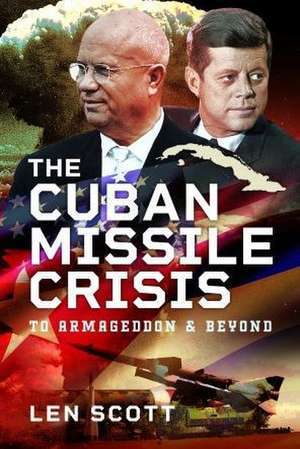The Cuban Missile Crisis
Autor Len Scotten Limba Engleză Hardback – 18 oct 2023
More ominously, we have learned of incidents and events that suggest nuclear weapons might have been used by subordinate military commanders, in circumstances frequently unknown to their political leaders. Decisions whether to use nuclear weapons lay in the hands of often junior military commanders, some of whom were perilously close to crossing the nuclear threshold. This does not mean - as often assumed - that if some nuclear weapons were used, escalation to all-out war was inevitable. Yet the undoubted risk of thermonuclear war in these circumstances threatened the very survival of civilization. Hundreds, if not thousands, of millions of people would have died from immediate and short-term effects, while the longer-term prospect of a 'Nuclear Winter' portended the virtual extinction of humanity.
Drawing lessons from sixty years ago faces significant challenges. If we draw lessons only to discover our understanding was mistaken, we might well have drawn the wrong lessons. Many received wisdoms about the crisis have been shown to be misleading. What is striking is how after forty or fifty or even sixty years, new evidence has emerged to challenge previously accepted explanations.
It is for the reader to reach their own verdicts on the history of the crisis, and how much we owe to political leaders who averted catastrophe (as well as how their words and deeds helped create the crisis in the first place). It is for the reader to conclude how close we came to nuclear war. Whatever conclusions are reached, one overriding lesson looms large. However we judge the actions of political and military leaders, one factor was crucial in why we avoided nuclear war in 1962. It was luck. In October 1962, humanity was very lucky. Will we be so lucky next time?
This book is an outstanding contribution to the ever-growing literature on the truly historic set of events making up the 'Cuban missile crisis'. While experts on the crisis will be familiar with many of the issues confronted, they will discover probably the best-written account of them, will surely learn something new, and be asked to question what they had come to think was settled. - Ken Booth FBA, Distinguished Research Professor, Aberystwyth University
Preț: 169.43 lei
Nou
Puncte Express: 254
Preț estimativ în valută:
32.42€ • 33.73$ • 26.77£
32.42€ • 33.73$ • 26.77£
Carte disponibilă
Livrare economică 25 martie-08 aprilie
Livrare express 08-14 martie pentru 33.96 lei
Preluare comenzi: 021 569.72.76
Specificații
ISBN-13: 9781526779786
ISBN-10: 1526779781
Pagini: 224
Ilustrații: 40 mono illustrations
Dimensiuni: 242 x 165 x 27 mm
Greutate: 0.55 kg
Editura: Pen & Sword Books Ltd
ISBN-10: 1526779781
Pagini: 224
Ilustrații: 40 mono illustrations
Dimensiuni: 242 x 165 x 27 mm
Greutate: 0.55 kg
Editura: Pen & Sword Books Ltd
Notă biografică
Len Scott is Emeritus Professor of International History and Intelligence Studies at Aberystwyth University, where he taught for twenty-five years and was Director of the Centre for Intelligence and International Security Studies (CIISS). He also served as Dean of the Social Science Faculty for ten years. During the 1980s, he worked for four years as political adviser to the Shadow Foreign Secretary, Rt Hon Denis Healey MP, and then in Whitehall as a civil servant in Her Majesty's Treasury. Professor Scott has published extensively on Cold War history, nuclear weapons, and secret intelligence. His writing on the Cuban missile crisis includes The Cuban Missile Crisis and the Threat of Nuclear War: Lessons from History (Bloomsbury, 2007); An International History of the Cuban Missile Crisis: A 50-year Retrospective [co-edited with David Gioe and Christopher Andrew] (Routledge, 2014) and The Cuban Missile Crisis: A Critical Reappraisal [co-edited with R. Gerald Hughes] (Routledge, 2015). Professor Scott is a Fellow of the Learned Society of Wales and a Fellow of the Royal Historical Society.
